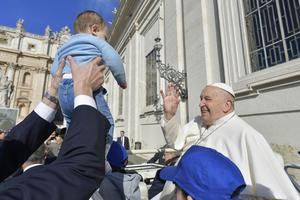Joseph Ratzinger’s Happy Death
EDITORIAL: Thanking Jesus — and the intercession of his earthly father St. Joseph — for allowing his faithful servant to depart from this life in such a happy and blessed way.

Pope Emeritus Benedict XVI — born Joseph Ratzinger — had a special devotion to his patron saint throughout his life, and his pious fealty was rewarded in the end with one of the greatest gifts any of us can ask for: a happy death.
For centuries, the Church has recognized the earthly father of Jesus as the patron of a happy death. “Happy,” not in the sense of giddy or carefree, or even free from pain, but rather a state of peace and contentment.
What made Benedict’s death a happy one? Consider the following:
He had time to prepare. At age 95, Benedict lived many more years than he expected when he resigned from the papacy in 2013, citing his frail health. He had nearly a decade after stepping down to quietly reflect on his life — and prepare himself for the life to come. The Vatican said his condition took a turn for the worse on Dec. 28. Benedict died three days later, ample time to say his goodbyes, confess his sins and receive the anointing of the sick from his devoted friend and longtime personal secretary, Archbishop Georg Gänswein.
Millions of people prayed for him. As Catholics, we take solace in the knowledge that we can benefit from the prayers of loved ones and strangers even after we die. All the better, though, if those prayers commence before we depart. And, frankly, it’s not “thoughts and prayers” we’re looking for when we’re in our final agonies; we want sincere, concentrated, sustained appeals to heaven. That’s what Benedict received in abundance during his last days: a flood of Masses, Rosaries, Divine Mercy Chaplets, votive candles and Holy Hours, offered up on his behalf by a sizable portion of humanity.
The Pope visited him. The presence of a good priest or an especially holy person is another hallmark of a holy death. St. Joseph, patron of a happy death, had both: Jesus and Mary. Imagine how you would feel at the end of your life if the pope himself arrived at your bedside, to bless you and hold your hand, as Pope Francis kindly did for Benedict.
He died at home, in his own bed. Thank God for hospitals and the doctors, nurses and others who work so selflessly in them. But most of us would prefer to pass from this life in the privacy and familiar comforts of our own homes, as Benedict was fortunate to do.
His affairs were in order. Benedict died having made his wishes known concerning the details of his funeral Mass and burial. And long before his death, in 2006, he drafted his “Spiritual Testament,” the final thoughts he wished to share with the Church and those closest to him. “Jesus Christ is truly the way, the truth and the life — and the Church, with all its insufficiencies, is truly His body,” he wrote. “Pray for me, so that the Lord, despite all my sins and insufficiencies, welcomes me into the eternal dwellings.”
His sights were on heaven. Finally, Benedict viewed death not as an end but as a beginning. It wasn’t just a consolation prize one receives at the end of life’s trials, but rather something one yearns for and runs to. “When I try to imagine what heaven will be like, I think it must be like the time when I was a small boy,” he remarked during a pastoral visit to Milan in 2012.
“In this environment of trust, joy, and love, we were happy, and I think that heaven must be rather like those early years. So in a way, I am hoping to return ‘home’ when I leave for ‘the other part of the world.’”
Along with the countless millions of other Catholics who loved Benedict in life, the Register joins in thanking Jesus — and the intercession of his earthly father St. Joseph — for allowing his faithful servant Joseph Ratzinger to depart from this life and “return home” in such a happy and blessed way.
St. Joseph, pray for us, that we, too, may receive the grace of a happy death!
- Keywords:
- benedict xvi
- happy death
- st. joseph
















